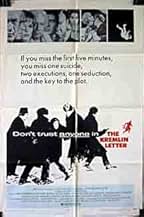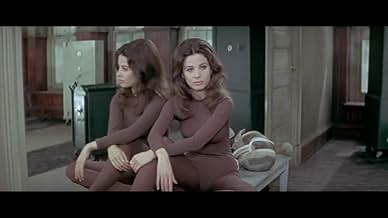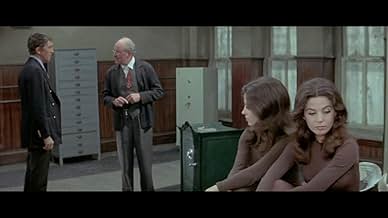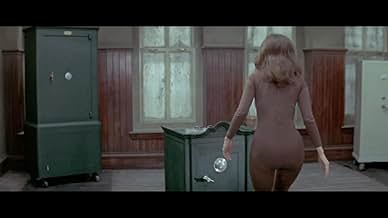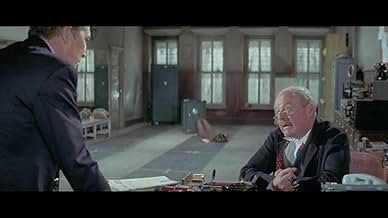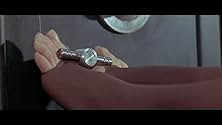Füge eine Handlung in deiner Sprache hinzuDuring the Cold War a Naval Intelligence officer endowed with a powerful photographic memory is transferred to the CIA to participate in a covert operation in Moscow.During the Cold War a Naval Intelligence officer endowed with a powerful photographic memory is transferred to the CIA to participate in a covert operation in Moscow.During the Cold War a Naval Intelligence officer endowed with a powerful photographic memory is transferred to the CIA to participate in a covert operation in Moscow.
- Regie
- Drehbuch
- Hauptbesetzung
- Lt. Grodin
- (as Sandor Eles)
Empfohlene Bewertungen
The story line is simple and I won't repeat it here. I will say that from the Highwayman's exit (near the beginning) to the final revelation, the film is non-stop. George Sanders is a bonus. Not absolutely necessary to the story but certainly an amplification of the stakes involved.
Ward is the key to the story (no pun intended). Rone is drawn in for his memory. The Whore, jaded and disinterested in anything other than his immediate existence agrees to participate for money... or perhaps something else.
Remember the opening scene in Mission Impossible (Tom Cruise version)? Phelps' wife is drugged and the race is on to get the information so she can be given the antidote. Contrast this 'we're in it together' attitude with the 'I'm in it for myself' attitude of the Kremlin Letter; lots of lies and deception, but completely self-serving. Not a platitude in sight. A refreshing 'honesty' for the new millennium... from a film nearly thirty years old.
Having seen several versions including the original theatrical release, television cut and the second theatrical release I can understand the misconceptions surrounding this film.
This film is extremely violent. The violence is not the '90's variety. You aren't shown it but you feel it. Bresnavitch's fear... Rone's 'matter of fact' attitude... Ward's 'direction'... The Highwayman's' resignation...
Oh, the method for Russian/English/Russian translation must be experienced. It might not be a first but I haven't seen it in any film since.
Finally I must add that there is not one likeable character in this movie... they are all far too human.
The movie is a disappointing Huston film and really pretty awful in general, but of some historic importance. The new ratings code was in place since 1968, "R" and "X" ratings were in, older directors like Huston felt the need to sex up their movies. "The Kremlin Letter" astonishes in the depravity of its characters. Message: spying is a dirty business, with no loyalties, and anything goes: prostitution, drug pushing, kidnapping of innocents, blackmail, torture, murder.
Along with the great, underrated Boone, this was among the last films for the elegant George Sanders and the interesting Nigel Green. Along with sweet-faced, mean-voiced Dean Jagger ("White Christmas"), these actors demonstrate just how deadly an "over-the-hill-gang" of old secret agents can be.
Not a good movie, not a coherent movie, but worth seeing for: Boone, Sanders, Green, Jagger -- and Huston's desperate attempt to get sexually trendy as the New Hollywood of the 70's kicked in. Problem: hard to see. Is it even available on tape?
The film has suspense , tension , emotion , mystery and specially in its final a little bit of violence . Although the picture has various ingredients for entertainment , the screenplay is confused and complex , the plot has gaps and results to be sometimes embarrassing and absurd . This movie was made and released about four years after its source novel of the same name by Noel Behn was first published in 1966 and this was the first ever adaptation for cinema of a work by Behn . This exciting picture was filmed in four countries: Finland, Italy, Mexico, and the USA ; the scenes set in Moscow were shot in Helsinki, Finland . A number of characters in this movie are known by code-names , these include "The Highwayman" (Dean Jagger); "The Whore" (Nigel Green); "The Warlock" (George Sanders); "Erector Set" (Niall MacGinnis) ; "The Negress" (Vonetta McGee); "The Priest" (Marc Lawrence); "The Dentist" (Victor Beaumont) and "The Puppet Maker" (Raf Vallone) . The film belongs to spy sub-genre developed during the cold war and its maxim representation are John LeCarre's novels adapted to cinema in various films such as: ¨The spy who came in from the cold¨ (by Martin Ritt with Richard Burton), ¨Deadly Affair¨(Sidney Lumet with Maximilian Schell) and Russia House (Fred Schepisi with Sean Connery) . The star studded casting is important with known international actors but with a blurred writing they appear acting with no sense . The film was regularly directed by John Huston (who acts in a very secondary role) . Rating : Mediocre , though entertaining .
The sexual politics of the film are outdated, perhaps. But, then, the political correctness of today is even more numbing.
The movie pops up on the Fox Movie Channel occasionally. Be sure to see it in letterbox.
By the way, Pauline Kael hated the movie. Funny, bitchy review in her book "Deeper Into Movies." But just because Pauline hated it, doesn't mean you will. She complains about the sound, but I didn't notice a problem. She also complains about the look of the film, but I think the verite style was intentional.
One tiny thing I thought I noticed, the old lady who is the mother of the Russian thief Barbara Parkins lives with seems to have too nice a manicure! I could be wrong. The moment flew by.
Wusstest du schon
- WissenswertesUses an artsy technique, considered innovative at the time, first used in "Judgment at Nuremberg" in 1961, where scenes begin in Russian and gradually segue to English, avoiding subtitles or dubbing into English.
- PatzerWhen Ward and the Whore talk in the bathroom at the end, the movie crew is reflected in the tiles.
- Zitate
Colonel Kosnov: [During drinks after a dinner party, with the wives present] It was a long time ago. I'm not sure of the details any longer.
Bresnavitch: The Colonel is too modest. Imagine. All he actually knew was that three of Sturdevant's men were in a small Polish village. Correct?
Colonel Kosnov: I think so.
Bresnavitch: He had to determine which of the 2,300 people in the village were the three he wanted, so he rounded up the entire population. He began to interrogate and execute each of them one by one. Then it seems that when your husband started killing the children one of Sturdevant's men tried to make a run for it. He was caught of course and your husband was able to make him talk, as only he can.
- VerbindungenReferenced in John Huston - Filmregisseur und Lebenskünstler (1988)
- SoundtracksLove Is a Many-Splendored Thing
(uncredited)
Music by Sammy Fain
Played on piano at the San Francisco gay bar
Top-Auswahl
- How long is The Kremlin Letter?Powered by Alexa
Details
Box Office
- Budget
- 6.095.000 $ (geschätzt)
- Laufzeit2 Stunden
- Farbe
- Seitenverhältnis
- 2.35 : 1
Zu dieser Seite beitragen



